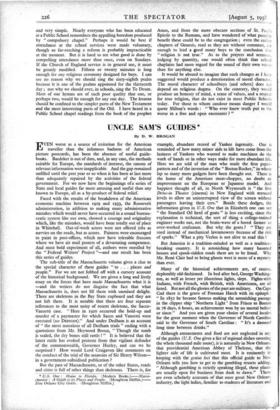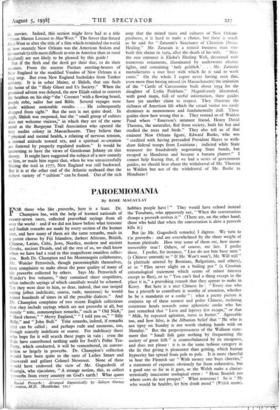UNCLE SAM'S GUIDES*
By D. W. BROGAN
EVEN worse as a source of irritation for the American traveller than the infamous badness of American picture postcards, has been the absence of useful guide- books. Baedeker is but of date, and, in any case, the methods suitable for Europe, the standards of interest, the canons of relevant information were inapplicable. And the gap remained unfilled until the past year or so when it has been at last more than adequately repaired by the activities of the federal government. For we now have the beginnings of a series of State and local guides far more amusing and useful than any known to Europe, all as a by-product of federal relief.
Faced with the results of the breakdown of the American economic machine between 1929 and 1933, the Roosevelt administration, in addition to making many administrative mistakes which would never have occurred in a sound bureau- cratic system like our own, showed a courage and originality which, like the mistakes, would have been totally out of place in Whitehall. Out-of-work actors were not offered jobs as navvies on the roads, but as actors. Painters were encouraged to paint in post-offices, which now have tolerable frescoes where we have air mail posters of a devastating competence. And most bold experiment of all, authors were enrolled by the " Federal Writers' Project "—and one result has been this series of guides.
The sub-title of the Massachusetts volume gives a clue to the special character of these guides " to . . . places and people." For we are not fobbed off with a cursory account of the historical background. We are given a long and lively essay on the forces that have made Massachusetts what it is —and the writers do not disguise the fact that what Massachusetts is, does not fill them with unmixed delight. There are skeletons in the Bay State cupboard and they are not left there. It is notable that there are four separate references to the most noisy of recent skeletons, the Sacco- Vanzetti case. " Here in 1920 occurred the hold-up and murder of a paymaster for which Sacco and Vanzetti were executed (see DEDHAM)." And under Dedham is an account of " the most notorious of all Dedham trials " ending with a quotations from Mr. Heywood Broun, " Though the tomb is sealed, the dry bones still rattle ! " It is believed that the latest rattle has evoked protests from that vigilant defender of the commonwealth, Governor Hurley, and can we be surprised ? How would Lord Craigavon like comments on the conduct of the trial of the assassins of Sir Henry Wilson— in a government-subsidised publication ?
But the past of Massachusetts, or of the other States, roads and cities is full of other things than skeletons. There is, for * U.S. One : Maine to Florida. • (Modern Books.)—Massa- chusetts : A Guide to its Places and People. (Houghton Mifflin.)- New Orleans City Guide. (Houghton Mifflin.) example, abundant record of Yankee ingenuity. One is reminded of how many minor aids to life have come from the laziness of Yankees who wanted to make machines do the work of hands or in other ways make for more abundant life. Here we are told of the man who made the first paper- pattern and of the invention of the " Boston Rocker," in whose lap so many more gadgets have been thought out. There is the home of the American meat-chopper, no doubt an improvement on the European or Japanese model. And happiest thought of all, in North Weymouth is " the first Drive-in Theater (cinema) in New England with terraced levels to allow an uninterrupted view of the screen without passengers leaving their cars." Beside these dodges, the information given in U.S. One that in Elizabeth one can see " the Standard Oil herd of goats " is less exciting, since the explanation is technical, the sort of thing a college-trained engineer works out, not the brain-wave of a bored farmer or over-worked craftsman. But why the goats ? " They are used instead of mechanical lawnmowers because of the risk of sparks." What a pity Verlen is not alive to read this !
But America is a tradition-minded as well as a tradition- breaking country. It is astonishing how many haunted houses and spook-ridden roads there are to be listed. Whys Mr. Rene Clair had to bring ghosts west is more of a mystery than ever.
Many of the historical achievements are, of course, deplorably old-fashioned. In bed after bed, George Washing- ton, as well as lesser yet illustrious lights, slept. Fights with Indians, with French, with British, with Americans, are all listed. But not all the glories of the past are military On Cape Cod there is the grave of Freeman Hatch with its epitaph " In 1852 he became famous making the astonishing passage in the clipper ship ' Northern Light' from Frisco to Boston in 76 days, 6 hours, an achievement won by no mortal before or since." And you are given your choice of several locales for the great moment when the Governor of North Caroline said to the Governor of South Carolina : " It's a damned long time between drinks."
Although amusements and food are not neglected in an:s- of the guides (U.S. One gives a list of regional dishes covering the whole thousand mile route), it is naturally in New Orleans. that providential American Abbey of Theleme, that the lighter side of life is cultivated most. It is eminently in keeping with the genius loci that this official guide to New Orleans tells you how to get to the gambling resorts adding, " Although gambling is strictly speaking illegal, these places are usually open for business from dusk to dawn." There are even scholarly accounts of that once great New Orleans industry, the light ladies, familiar to students of literature and the movies. Indeed, this section might have had as a title From Manon Lescaut to Mae West." The forces that forced Miss West to alter the title of a film which, reminded the world of how recently New Orleans was the American Sodom and Gomorrah {a title more difficult to win in America than in rural England) are not, likely to be pleased by this guide !
But if the flesh and the devil get their due, so do their enemies. From the austere Puritan meeting-houses of New England to the modified Voodoo of New Orleans is a long step. But even New England backslides from Yankee sobriety. It is in sober Maine, at Shiloh, that one finds the home of the " Holy Ghost and Us Society." When the promised advent was delayed, the new Elijah sailed to convert the heathen on his ship " the ' Coronet ' with a flowing beard, purple robe, sailor hat and Bible. Several voyages were made without .noticeable. results/ . . . He subsequently dropped from sight". But the sect is not quite dead. In 1936, Shiloh was reopened, but the " small group of cultists does not welcome visitors," in which they are of the same mind as the Burgoyne Trail Association who opened the first nudist colony in Massachusetts. They believe that " physical and mental health, a relaxing of nervous tension, a normal attitude toward sex, and a spiritual re-creation are fostered by properly regulated nudism." It would be interesting to have the views of Gentleman Johnny on this theory. It might have suggested the subject of a new comedy to him, or made him regret that, when he was unsuccessfully blazing the trail in 1777, New England was still backward. But it is at the other end of the Atlantic seaboard that the richest variety of " cultism " can be found. Out of the rich crop that the mixed races and cultures of New Orleans produces, it is hard to make a choice, but there is much to be said for " Zatarain's Sanctuary of Christian Divine Healing." Mr. Zatarain is a retired business man who built this shrine in 1929, after the death of his wife. " Near the rear entrance is Elisha's Healing Well, decorated with numerous ornaments, illuminated by underwater electric lights, and containing ' holy goldfish.' . . . Mr. Zatarain manufactures a root beer with which he is said to work cures." On the whole I regret never having seen this, even more than having missed (in Massachusetts) the imitation of the " Castle of Carcassonne built about 1934 for the daughter of Lydia Pinkham." Magnificently illustrated, with good maps, full •of useful information, these guides have yet another claim to respect. They illustrate the richness of American life which the casual visitor too easily dismisses as monotonous and fundamentally dull. These guides show how wrong that is. They remind us of Walden Pond where " Emerson's intimate friend, Henry David Thoreau, the naturalist, fled from society, built his but and studied the trees and birds." They also tell us of that eminent New Orleans figure, Edward Burke, who was " credited with having persuaded President Hayes to with- draw federal troops from Louisiana ; indicted while State treasurer for fraudulently negotiating State bonds, but escaped to Honduras and became a banana planter." I cannot help fearing that, if we had a series of government guides, we should hear about the withdrawal of Mr. Thoreau to Walden but not of the withdrawal of Mr. Burke to Honduras !



































 Previous page
Previous page